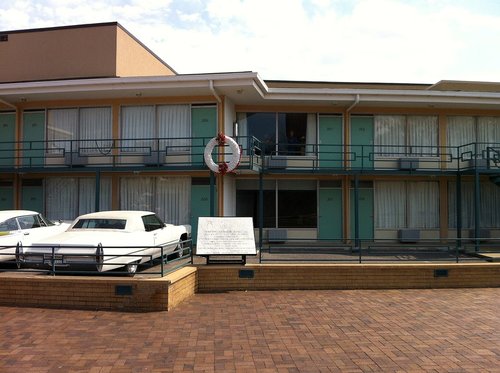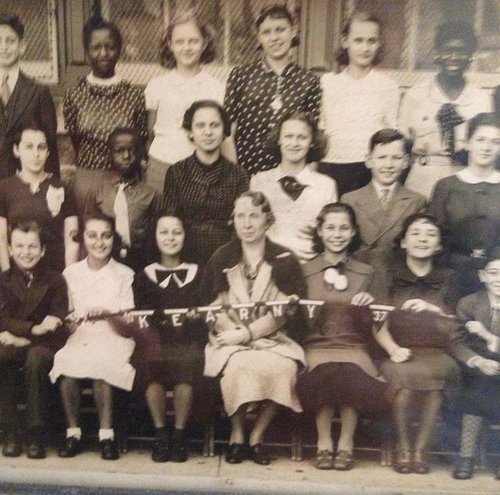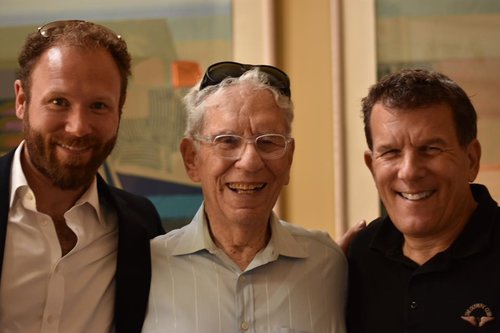Here is a personal, thoughtful article from my friend, Justin C. Cohen challenging Jewish people to be anti-racists. He always writes with clarity, humility, and thoughtfulness. If you haven’t read his work, dive in!
When Jews around the world observe Yom Kippur, the holiest day on the Jewish calendar, the word “celebrate” is not quite appropriate. Saturday, on this “Day of Atonement,” Jews will ask forgiveness for the various sins of the past year. Many pray, observe a ritual fast, and attend services.

The Lorraine Motel, where Dr. Martin Luther King, Jr. was assassinated, now the home to the National Civil Rights Museum.
But the central tenet of Yom Kippur – captured in the moving “Al Chet” prayer – requires us to seek public, private, and spiritual atonement, not just for our “intentional” sins, but also for those we “inadvertently” commit. I thought about this prayer on the Jewish New Year, which I spent in Memphis last week, with a group of close friends visiting the National Civil Rights Museum at the Lorraine Hotel. As I stood in silent, tearful reflection in the room where Dr. Martin Luther King was killed almost fifty years ago, I contemplated atonement.
I considered forgiveness on that day, in that place, because all White Jews in America have participated in the maintenance of White supremacy. The privileges created by our uniquely American system benefit all White people, including Jewish people of European heritage. Some of the effects are subtle. As a White, Jewish dude, I can walk into the lobby of a fancy hotel and pretend it’s my home office, with little fear of confrontation or consequences. There also seem to be no limits to how many red lights I can ignore while riding my hipster bicycle through Brooklyn, while my Black friends get ticketed for tiptoeing in crosswalks. Those quotidian advantages can seem inconsequential, but they are not. Black Americans experience extraordinary harassment, often masquerading as mere inconvenience, from law enforcement and other authorities, just for living in their own skin.
Those daily micro-privileges, however, pale in comparison to how years of systemic advantages have compounded to White people in much more concrete and pecuniary ways. My White, Jewish grandfather – whose parents were refugees from the pogroms of Eastern Europe – served in the army during World War II, worked for the federal government, and bought a house in a middle-class neighborhood. A cousin of his once tried to steal his right to a Veterans’ Administration home loan, that’s how tangibly valuable these government-sponsored ladders to the American Dream were. My dad benefitted from my grandfather’s ability to accrue wealth, as did I. All of this happened after the abolition of slavery, not to mention in the putatively progressive American Northeast.
In the meantime, while my grandfather “played by the rules,” the rules were rigged against people who didn’t have White skin. Black families – whose longevity in this country far outstrips that of my Jewish forebears – were barred from voting, holding federal jobs, buying homes in middle-class neighborhoods, and attending public schools. My grandfather attended what was then one of the country’s few mixed-race public high schools (Philadelphia’s Central High), and he reminds me still today that there is simply no comparison between the advantages he has enjoyed, and the hardships his classmates of color have faced.
Several years ago, my grandfather – who is now in his mid 90s – went to a high school reunion at a country club in the Philadelphia suburbs. The president of his class, who was Black, looked around at the few living members of the class, all of whom were either Black or Jewish. Reflecting on their similarities and differences, he said, to big laughs, “You know, we never had everything in common. But I can tell you one thing: NONE of us would have been ALLOWED in this country club when we were in high school!”

My grandfather’s middle school picture.
My grandfather cracks up when he tells this story, even though the punchline is impossible to get without knowing this country’s complicated relationship to race, Whiteness, and discrimination. When he was in high school, Jews weren’t really considered “White.” But after generations of assimilation and social progress, Jews of European descent can seem indistinguishable from other White Americans.
Eventually, though, something shatters that fragile sense of belonging and progress. When White supremacists marched in Charlottesville last month, chanting Nazi slogans and proclaiming “Jews will not replace us,” they brought into the surface something that Jews have always understood about their status in America: “provisionary Whiteness.” Provisionary Whiteness can be revoked for a whole host of reasons: for speaking forcefully against White supremacy; for looking TOO Jewish; for not looking Jewish ENOUGH; and for many other perceived offenses against the supposed benevolence of the dominant culture.
But while anti-Jewish sentiment is real, White Jews must reckon with the fact that we will never walk in Black skin, that our history in America is nowhere near as devastating as the history of that of Black Americans, and that our Jewish-ness does not give us a “get out of jail free card” when it comes to being allies in the fight for racial justice. We must not say “but what about us?” when we bear witness to the racism visited upon Black Americans, and we cannot ignore the injustices that are invisible only because we do not experience them.

From left to right: me, my grandfather, and my dad.
On this Yom Kippur, I will atone for White supremacy. It is the most devastating sin in which I inadvertently participate, and I do so just by walking in the skin in which I was born. While I possess no choice regarding my skin-tones, I can control how I either uphold or undermine the unfair advantages conferred to me by those hues. Some prominent White Jews want to define White supremacy on their own terms, so that we might avoid culpability. These efforts at rebranding are an evasion of responsibility and an affront to the work of our friends of color, who have worked for generations to define and fight these bedrock sins of our culture. Until all White people – Jewish or not – take responsibility for the faults of our country, none of us can ever truly be free.
I ask my Jewish brothers and sisters to join me in this act of atonement. Please don’t stop there, though, as you should also talk to your family and friends about racism, while preparing yourself to be a part of a long struggle. The rooms that precede Dr. King’s at the National Civil Rights Museum constitute a march through several decades of activism and organizing. Each exhibit is striking on its own: the Montgomery Bus Boycott; the Freedom Riders; the Memphis Sanitation Strike; the March on Washington; and more. The overall effect is to contextualize each action as part of a much larger, multi-generational movement for justice. As Jews, we have no shortage of that particular theme in our own history. What better way, then, to spend our holiest day, than in solidarity with our friends and families of color, whose multi-generational march for progress endures today.

